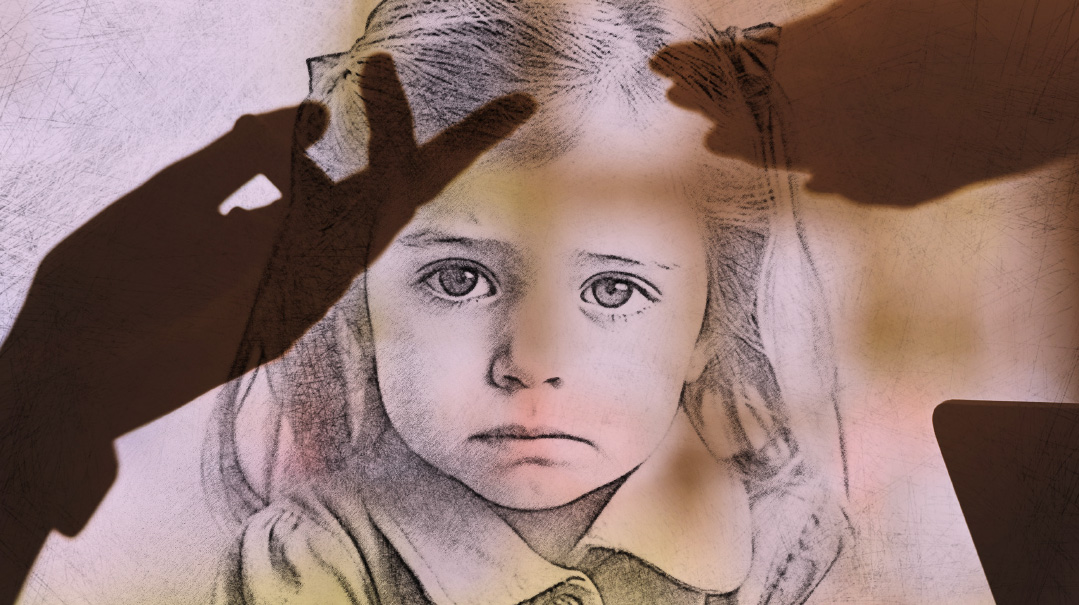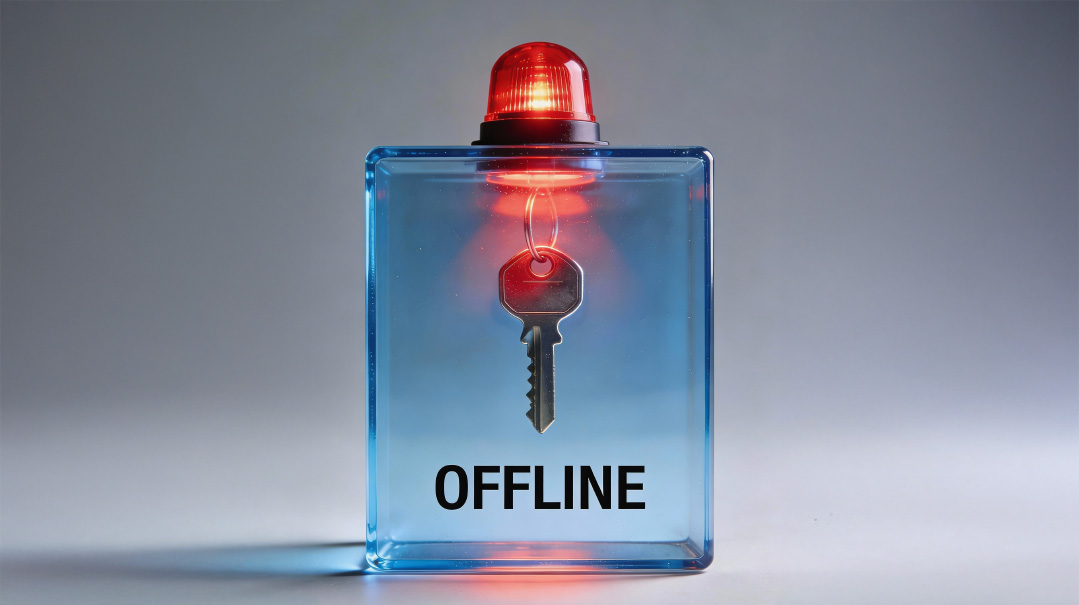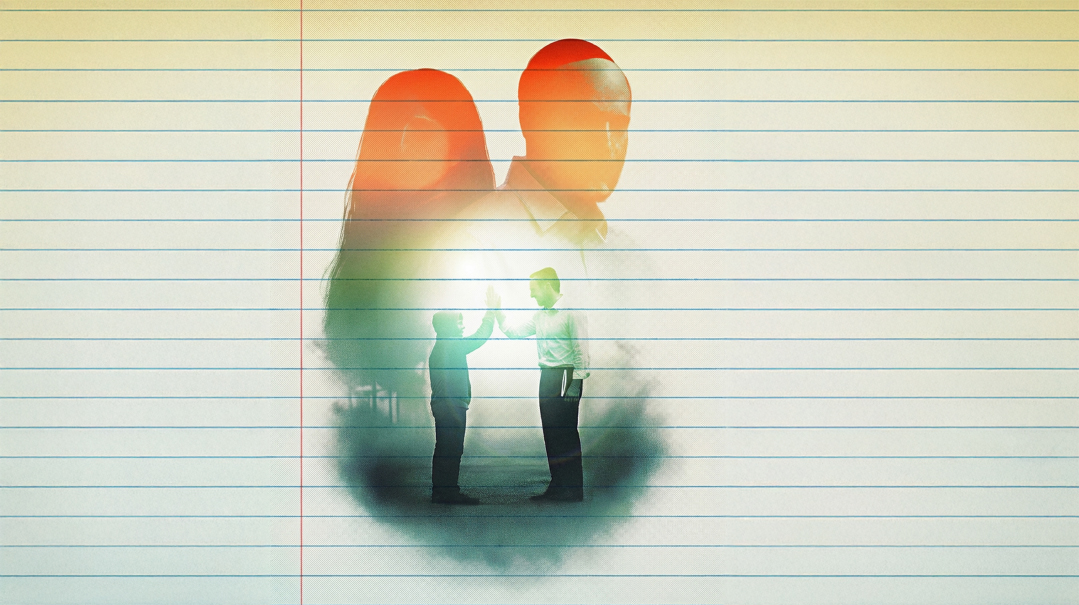Ready or Not
| May 23, 2023You’re my friend — how could you withhold your suspicions from me and delay my child getting the help she needed?

Shayna: I could have gotten my daughter help so much earlier had you only spoken up.
Talia: I didn’t share my suspicions because you didn’t seem open to hearing them.
Talia
It sounds cheesy, but I really love my job.
I work as an early intervention therapist, and I love everything about what I do (well, maybe not the paperwork, but everything else). I enjoy working with the parents and adorable little ones, and I get such satisfaction from seeing my little clients progress toward their goals.
My family and friends know how enthusiastic I am about what I do, and over the years, I’ve kind of become the go-to for anyone in my social circle who’s looking for informal advice on therapies for their babies or children. Obviously, that’s not a replacement for a formal evaluation and services, but I’m happy to help.
So Shayna’s call was pretty typical.
Shayna’s a friend of mine from way back. She’s a few years younger than me, but we lived next door to each other growing up, and we bump into each other every so often and stop to schmooze.
Now, she was calling with a question. “So, I know you work with babies, and you do some sensory stuff, right?”
“I do help children with sensory integration, yes. That’s one of the things I do,” I said.
“Right, for sure, it’s just the sensory issue I wanted to ask about. Basically, my Mimi — she’s two and a half, and I think she has some kind of sensory issue. She’s often uncomfortable, like maybe it’s the clothing? I’m not sure. Or she wants me to hug her tightly, things like that. I was wondering… maybe I could bring her over sometime, and you could give me some ideas how to help her?”
“Sure,” I said. I was always happy to give some tips to a friend. “Wanna come over one afternoon? My Eli would love to have company.”
“Oh, Mimi’s not really the type to play together, she’s very particular about how she does things,” Shayna said, laughing a little. “Two going on 20, huh?”
I chuckled weakly. Actually, I thought Shayna’s concerns were slightly… alarming. But I would reserve judgment until I saw Mimi for myself.
We arranged for Shayna to come over on Tuesday afternoon around four p.m., but by the time she showed up, it was closer to five.
“I’m so sorry!” Shayna said. She seemed heavily expecting, and was panting as she pushed the stroller inside. “Mimi had a massive tantrum on the way out of the door, it took forever to calm her down, and then again in the car…” She exhaled heavily.
“Anyway, I’m due soon b’ezras Hashem, and I figured I should try to get some advice on handling Mimi before — before there’s a lot more on my plate. So that’s why I’m here. I think it’s all the sensory issues, maybe going out overstimulates her? I just want some ideas of how I can help her handle things better.”
Mimi was an adorable toddler, with cherubic pink cheeks featuring a smattering of freckles, and gold-tinted auburn curls tied with an oversized bow. She was also frowning intently and staring at something on the wall behind me.
“Hi, Mimi,” I said.
There was no response.
“Mimi?” I knelt in front of her.
“I guess she’s tired,” Shayna said. “Mimi, say hi to Mommy’s friend Talia.”
Mimi finally blinked and turned in our direction, but I noticed she didn’t make direct eye contact with me.
Shrill warning sirens began blaring in my mind.
“Why don’t you take Mimi out of the stroller, she can play something,” I suggested. When I go to do therapy for babies, I bring a lot of toys with me; here in my den, though, we had plenty of Eli’s toys scattered around.
Mimi wasn’t happy to be here, though. She clung to her mother, crying and kicking, while Shayna tried desperately to calm her enough to interest her in the toys.
“She’s super tired, it just got so late, it’s nearly her bedtime,” Shayna told me, raising her voice over Mimi’s cries. “She probably wants a drink — hold on.”
She dug through her bag and fished out a bottle. Mimi took one sip and pushed it away.
“Paci?”
Mimi continued to cry.
“I’ll play with you, Mimi, okay?”
Shayna settled on the floor with difficulty, Mimi balanced in her lap. “Look, wanna play with this truck?” She looked over at me. “This is the best. Mimi loves trucks and cars. Funny, no? You’d think she’d go for the dolls.”
I watched Mimi pick up a truck and start spinning the wheel.
And spinning.
And spinning.
I crouched down beside them. “Mimi, you wanna make the truck go vroom, vroom?” I took another one of Eli’s trucks and wheeled it alongside hers. “Look, see how I’m driving it?”
Mimi ignored me.
The unease in my stomach intensified.
I sat back, leaning against the base of the sofa.
“Shayna…” I said, then I stopped. I wasn’t qualified to diagnose, and how could I share my suspicions just like that?
I decided to try more subtly. “I see what you mean, why you’re worried about a sensory issue,” I said slowly. “Would you take her for a full evaluation?”
“Evaluation? What for? She doesn’t need help, she’s super advanced. She talks so nicely.” Shayna made a face. “I mean, when she isn’t throwing a tantrum. But still.”
She was right. Physically, Mimi was developing just fine. But these signs… I knew these signs. And after seeing so many kids like this, your gut knows when there’s something really wrong.
“Maybe it’s worth having her evaluated anyway. To check if there’s anything to be concerned about,” I persisted.
“I’m pretty sure it’s just a sensory thing. Like being overstimulated…” Shayna was standing her ground. “I spoke to someone, and she was telling me about getting the right toys, sensory input, and everything should be fine.”
There was a note of desperation in her tone.
I could see why. Here she was, with a challenging toddler, a baby on the way… she didn’t have the headspace for a diagnosis. She just — couldn’t.
“See, she’s playing so nicely,” Shayna said brightly.
Mimi had put down the truck she was holding and picked up the one I’d been driving. Immediately, she turned it upside down and started spinning the wheel.
Playing so nicely.
The alarm bells were clanging so loudly in my mind, I couldn’t believe Shayna wasn’t hearing them.
ASD. ASD. ASD.
But she hadn’t come for a diagnosis, and I wasn’t qualified to give one. I wasn’t going to just dump it on her that I suspected Autism Spectrum Disorder. I’d tried guiding her to get a real evaluation, but she wasn’t interested. I was just a friend, not even a super close one. I couldn’t say anything without hurting her terribly — and she didn’t look like she was in a position to listen and deal with the situation even if I spelled out my suspicions word for word.
So I just kept quiet.
The next time I met Shayna, she was pushing a double stroller, with newborn twins inside. Mimi was nowhere to be seen.
“My mother took her for a week. The twins are so difficult, and I just couldn’t deal with Mimi as well,” she told me.
“Oh, wow,” I said. “How’s she doing?”
“Yeah, great,” Shayna looked distracted. “Those toys you suggested were a good idea. She likes taking them under her bed to play with them there. It’s so cute.”
Why was I biting my lip again?
And why didn’t she realize something was wrong with her daughter?
“It… helped with the, you know, tantrums and stuff?” I probed delicately.
Shayna made an offhand gesture. “Listen, she’s Mimi, she has personality, she always did. And everyone says it’s so hard for the oldest to get used to having a new baby. And here we have two at once! She used to get all the attention, and now she’s in third place. Of course she’s overwhelmed.”
She rattled this off like she’d memorized it. To reassure herself? Or maybe because she was right, who knew? I wasn’t a diagnostician, and we hadn’t even had a formal evaluation session.
And, I reasoned, if it really was ASD, she’d find out eventually. It would become obvious over time. And then, if she wanted my support or advice, I’d be happy to help.
After that, I didn’t bump into Shayna for a long time. I thought about her from time to time and wondered what was doing, figuring she must be busy with her toddler and twins.
But when I eventually met Riva, another acquaintance, who was also Shayna’s sister-in-law, I couldn’t help myself. Two years had passed since Shayna had come to my house, but I still felt queasy when I remembered her visit.
“How are you, what’s doing?” We did the small talk thing.
Finally, I took the plunge. “How’s Shayna doing?” I asked. “I haven’t seen her in ages.”
“Right. She hasn’t been out much. The truth is…” Riva lowered her voice. “She’s not doing so well. Her older daughter — Mimi — got diagnosed with ASD recently, and Shayna’s taking it really, really hard. To be honest, she struggled with her for a long time, but she never — we didn’t think…”
My heart dropped to my shoes. This was what I’d feared all along. What my heart had known ever since Shayna brought her two-year-old over to my house to talk about sensory issues and toys.
And yet, how would it have helped me to share my suspicions when she was so adamantly not interested in looking further?
“She keeps saying that she wishes she’d known earlier,” Riva said. “My opinion is that it wouldn’t have made a difference. She never really thought anything was wrong with Mimi, it’s only really showing up now, in preschool. But you know how it goes… now she wishes she could’ve started therapies earlier… I hear the point.”
So did I. And yet I knew exactly why I hadn’t told her earlier.
If I could tell Shayna one thing, it would be: I did my best to point you in the direction of a professional evaluation, but you weren’t ready to hear it — and without being qualified to give a diagnosis, would sharing my suspicions have helped or harmed?
Shayna
Mimi was a dream baby.
I bonded with my little pink bundle of joy right away, falling in love with my baby and motherhood and everything about it all at once.
I was a stay-at-home mom and loved it, taking Mimi with me everywhere — the grocery, the mall, the park.
And Mimi was delicious; she had the face of a china doll and the most adorable curly hair.
She didn’t gurgle and giggle much, she was often cranky when I didn’t pick her up right away, but she was a baby, right? And she had her own personality; it was becoming clearer every day.
I’m not sure exactly when I started getting frustrated. It must have been around the two-year mark, when Mimi should’ve been getting a little more independent, and instead was still as clingy as ever. But I reassured myself that this was normal and chalked it up to her never having gone to a babysitter. What did I want from her?
What I found hard were the tantrums. I know they call it Terrible Twos for a reason, but Mimi’s tantrums were so long and draining. I mentioned it to a couple of friends, and one of them told me about her son who had sensory integration issues.
A lightbulb went off in my head. Mimi hated going out to busy places, she threw tantrums in the car, only liked certain foods and clothing… that was exactly it, sensory issues.
And I knew exactly who to turn to for advice.
Talia and I were close years ago, but we’d both moved on and didn’t have so much to do with each other now. Still, when I called her up and shared my problem, she right away offered to see Mimi and give her unofficial advice.
It was a bit of a disaster, to be honest. Mimi was totally wound up that afternoon and ended up having a huge meltdown on the way out the door. It took forever to calm her, and then when we actually got there — an hour later than planned — she started crying again.
“I’m so sorry,” I told Talia. This was so stressful — I needed Mimi to cooperate, this was my chance to get some advice, and there was no way I was shlepping her out a different evening. As it was, I was absolutely done for, and we still had a while to go until bedtime.
Talia tried to coax Mimi to talk to her, get her to play, but I knew what she was like with strangers, so I intervened, sitting down on the floor myself — yes, in my eighth month, it was a feat of epic proportions — and holding her on my lap to help her stay calm while she played.
Talia watched her for a few minutes, playing with the trucks.
“Shayna,” she said finally. “I see what you mean about a sensory issue. Would you consider taking her for a full evaluation?”
A full evaluation?
She had to be kidding.
I was due any day — with twins, anything could happen, I couldn’t rely on making it until my due date — and had my hands fuller than full dealing with Mimi day-to-day. I wasn’t putting anything extra on my plate at all. Even this — a visit to a friend for some unofficial advice — was too much for me.
“She doesn’t need help like that, she’s super advanced,” I told Talia. “It’s just the sensory issues and the tantrums. I want to help her manage in different environments. Isn’t there anything I can do at home?”
“I think it’s worth having her evaluated anyway,” Talia persisted.
I held back an eye roll. She was such a therapist, she thought everything had to be done formally and officially. Well, Talia wasn’t about to have twins, and it was all very nice to say just do it, what harm can it do to get an evaluation done, when you’re not dealing with everything yourself.
“I’m pretty sure it’s just a sensory thing,” I said. “I spoke to someone, and she was telling me about getting the right toys, sensory input, and everything should be fine. Isn’t there anything I can do on that end, without dragging Mimi through a whole evaluation?”
Which would throw her off completely, I didn’t add. Imagining Mimi with a stranger assessing her development was a disaster. She would have a whole meltdown, and they wouldn’t be able to see what a cute, bright toddler she really was.
“I can show you what I use to help kids with sensory integration,” Talia said, somewhat reluctantly, and I sighed in relief. That was all I wanted. Hopefully, it would make the shlep out to Talia’s place worth it.
I ordered Mimi a bunch of sensory toys and supplies on Amazon. They arrived a few days later, and Mimi seemed to like them, but we didn’t have much time to try them out — a week or two after that, the twins were born.
As I’d predicted, life took on a new level of crazy after that. Baby, baby, toddler. Cry, feed, rock, meltdown. Bottles and diapers and naptimes and toys. My husband, Aryeh, tried to help out, but he worked crazy hours, and even though he took some time off when we had the twins, after a few weeks he couldn’t make excuses anymore.
Mimi was difficult — or rather, impossible. I’d expected that; she’d gone from being a pampered only child, Mommy’s princess, to one of three, two of whom needed far more physical care than she did. We had a night nurse for a while, and I found high school girls to watch the twins some afternoons, but it was still a lot.
When I felt I couldn’t handle things anymore, my mother took Mimi for a week. That was huge; it gave me some time to get the house in order, focus on the twins, try to get my act together again.
It seemed like forever, but slowly, we got used to the new normal, and Mimi seemed to relax a bit. She loved her new toys, and developed this new habit of playing with one or two of them under her bed for hours on end. It was a relief that she was learning to self-entertain and that she was happy and busy. And I guess under the bed was her “house.” She had such an imagination.
The days were still long, but the weeks whizzed by. Life was busy, Mimi was finding her feet, the twins were growing faster than I could even believe. Aryeh got a promotion and was working even crazier hours, the days and nights were a blur, and somehow, months passed, and then a year, and another one, and Mimi was starting preschool.
And that’s when everything changed.
Morah Etty, Mimi’s preschool morah, called me a few weeks into the school year.
“Mimi’s such a gorgeous little girl, kein ayin hara,” she began. My stomach dropped. This didn’t sound like it was heading in a good direction.
“I’m just… wondering,” Morah Etty said, carefully. “In your experience, does she play nicely with other children? I’m noticing… Mimi seems to enjoy keeping to herself. It could be she’s still adjusting to the new environment, but…”
I jumped on that.
“Look, it’s a massive change for her,” I said. “She’s not really used to being around so many other kids her age. So it’s probably taking her time to adjust.”
“But with her siblings, her cousins. Does she ever sit and play with them? Or just alongside?”
I frowned. I actually had no idea. “Well, her siblings are twins, and they’re still very young, so she doesn’t really play with them at all. When I take her to a friend’s house… I guess she does her own thing, but don’t most toddlers do that?”
“It could be a stage. But at this age, most kids are already interacting more,” Morah Etty said. “Look, I wanted to check if you’d noticed anything like this, but if you’re not sure, I’m going to keep watching her, and we’ll see. Maybe she is really just still adjusting.”
She didn’t sound convinced.
A few weeks later, she called again. This time, she asked if I’d come in to meet with her one morning, while her assistant watched the class.
“I’m so sorry to bring this up,” she told me, laying a hand on my arm. “But I’m really worried about your Mimi. She’s still showing very little social interaction, and we’re already a few months into the year.”
My chest felt tight. Mimi, what was wrong with Mimi? She was so adorable, why didn’t she have friends? “What… can we do about that?” I asked.
Morah Etty wasn’t done, though. “There are other concerns, too. She doesn’t follow directives — even simple, everyday ones, like when we tell the children to put their coats on to go to the playground. She’s not behaving badly — I honestly don’t think she processes what she’s meant to be doing. But that’s a problem, at four years old. The other children know, it’s a routine, we do playtime, davening, then we go outside. Most of them run to their hooks before we even say to. But Mimi just — doesn’t. It’s almost like she’s in her own world.”
The words hit me hard. In her own world. That meant — they suspected —
“Do you think something’s really wrong with her? Like, you know—” I couldn’t say it.
“I would definitely recommend an evaluation,” Morah Etty said. “I’m happy to provide more information. It will help paint a picture for the doctor.”
We took her to be evaluated, of course. And that’s when we found out.
My precious, beautiful, oldest daughter Mimi was autistic.
And I’d had no clue.
I just couldn’t believe it.
I couldn’t believe that we didn’t know earlier.
As I started navigating the wearying journey of obtaining services, therapy, and care for Mimi and her new diagnosis, I realized how much time I’d lost.
I could have been getting services for her years ago. Could have gotten help — real help — with her meltdowns and challenges, could have started her on therapy, helped her develop skills that she needed at a younger age… how could I not have known?
“We didn’t ask anyone,” Aryeh said reasonably. “It’s over, now we know, so we’ll do our best from here.”
But that wasn’t true. I winced, thinking of our visit to Talia, when I’d wanted sensory advice. I remember how she’d brought up the idea of an evaluation; at the time, I’d thought she was being overly cautious. But maybe not?
Had she known something? Suspected it?
And if so, why hadn’t she told me?
I met Talia one day when I was visiting my parents — her parents lived next door.
Seeing her brought up all the angst and frustration all over again.
She said hi to me and asked, with a fraction of a moment’s hesitation, how Mimi was doing.
So she did know.
“Did you know she had ASD? When I brought her to you?” I asked bluntly.
She looked at me, wide-eyed, opened her mouth, closed it again.
“I did… wonder,” she admitted, finally. “If you remember… I suggested getting an evaluation, because I was a little worried by what I saw… but you didn’t seem like you wanted to go that route.”
How could she not take responsibility like that? As if this were my fault?
“But I had no idea! I didn’t know any of the signs for ASD, I’d never come across this before. Why didn’t you tell me? I told you about the meltdowns, you saw the way she was playing…”
Talia took a step back. “I’m sorry… I felt like it wasn’t my place. I’m not qualified to diagnose anything. I just — it didn’t seem like what you needed to hear just then.”
What I needed to hear?
How about what my daughter needed?
I pressed my lips together to stop myself from blurting out something I’d regret. But inside, I was furious. She was a professional, an early intervention therapist, and a friend. How could she not have told me?
If I could tell Talia one thing, it would be: You’re my friend — how could you withhold your suspicions from me and delay my child getting the help she needed?
(Originally featured in Mishpacha, Issue 962)
Oops! We could not locate your form.







